英语中时间和介词的搭配
- 格式:doc
- 大小:25.50 KB
- 文档页数:1
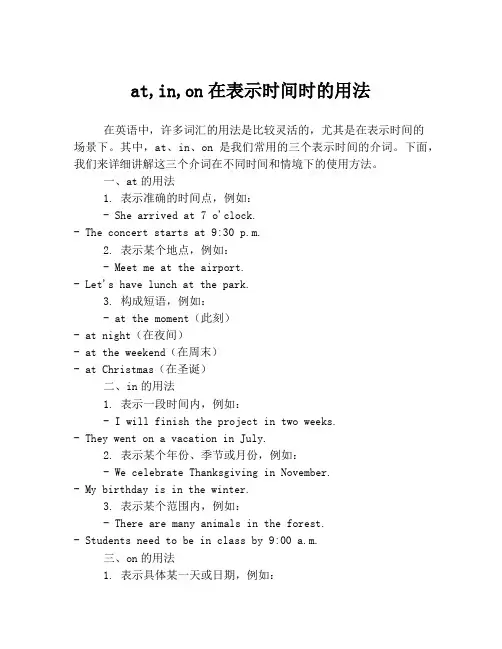
at,in,on在表示时间时的用法在英语中,许多词汇的用法是比较灵活的,尤其是在表示时间的场景下。
其中,at、in、on是我们常用的三个表示时间的介词。
下面,我们来详细讲解这三个介词在不同时间和情境下的使用方法。
一、at的用法1. 表示准确的时间点,例如:- She arrived at 7 o'clock.- The concert starts at 9:30 p.m.2. 表示某个地点,例如:- Meet me at the airport.- Let's have lunch at the park.3. 构成短语,例如:- at the moment(此刻)- at night(在夜间)- at the weekend(在周末)- at Christmas(在圣诞)二、in的用法1. 表示一段时间内,例如:- I will finish the project in two weeks.- They went on a vacation in July.2. 表示某个年份、季节或月份,例如:- We celebrate Thanksgiving in November.- My birthday is in the winter.3. 表示某个范围内,例如:- There are many animals in the forest.- Students need to be in class by 9:00 a.m.三、on的用法1. 表示具体某一天或日期,例如:- I have a doctor's appointment on Monday.- Our anniversary is on December 12th.2. 表示某个特定时间或节日,例如:- On Sunday morning, we always go to church.- We celebrate Halloween on October 31st.3. 表示周几,例如:- She has piano lessons on Tuesday.- We have a meeting on Friday afternoon.除此之外,还有一些特殊情况,需要用到at、in、on相应的结构,例如:- at night(在夜间),in the morning(在早上),on the afternoon(在下午)- at the same time(同时),in the meantime(与此同时),on time(准时)总之,at、in、on在表示时间的用法要视具体情境而定,需要根据上下文来了解其具体意义和用法。
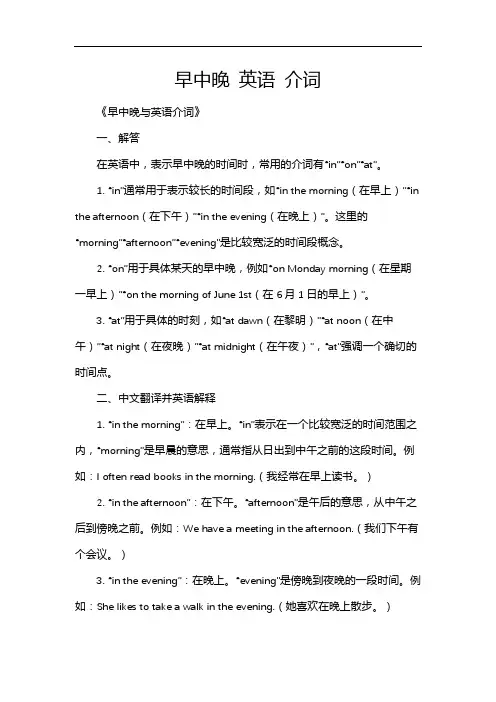
早中晚 英语 介词《早中晚与英语介词》一、解答在英语中,表示早中晚的时间时,常用的介词有“in”“on”“at”。
1. “in”通常用于表示较长的时间段,如“in the morning(在早上)”“in the afternoon(在下午)”“in the evening(在晚上)”。
这里的“morning”“afternoon”“evening”是比较宽泛的时间段概念。
2. “on”用于具体某天的早中晚,例如“on Monday morning(在星期一早上)”“on the morning of June 1st(在6月1日的早上)”。
3. “at”用于具体的时刻,如“at dawn(在黎明)”“at noon(在中午)”“at night(在夜晚)”“at midnight(在午夜)”,“at”强调一个确切的时间点。
二、中文翻译并英语解释1. “in the morning”:在早上。
“in”表示在一个比较宽泛的时间范围之内,“morning”是早晨的意思,通常指从日出到中午之前的这段时间。
例如:I often read books in the morning.(我经常在早上读书。
)2. “in the afternoon”:在下午。
“afternoon”是午后的意思,从中午之后到傍晚之前。
例如:We have a meeting in the afternoon.(我们下午有个会议。
)3. “in the evening”:在晚上。
“evening”是傍晚到夜晚的一段时间。
例如:She likes to take a walk in the evening.(她喜欢在晚上散步。
)4. “on Monday morning”:在星期一早上。
“on”用于特定的某一天的早上,“Monday”是星期一。
例如:He goes to school on Monday morning.(他星期一早上去上学。
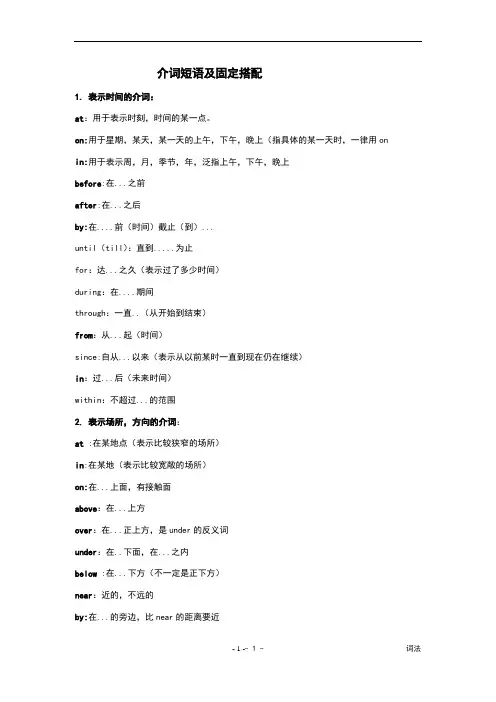
介词短语及固定搭配1. 表示时间的介词:at:用于表示时刻,时间的某一点。
on:用于星期,某天,某一天的上午,下午,晚上(指具体的某一天时,一律用on in:用于表示周,月,季节,年,泛指上午,下午,晚上before:在...之前after:在...之后by:在....前(时间)截止(到)...until(till):直到.....为止for:达...之久(表示过了多少时间)during:在....期间through:一直..(从开始到结束)from:从...起(时间)since:自从...以来(表示从以前某时一直到现在仍在继续)in:过...后(未来时间)within:不超过...的范围2. 表示场所,方向的介词:at :在某地点(表示比较狭窄的场所)in:在某地(表示比较宽敞的场所)on:在...上面,有接触面above:在...上方over:在...正上方,是under的反义词under:在..下面,在...之内below :在...下方(不一定是正下方)near:近的,不远的by:在...的旁边,比near的距离要近between:在两者之间among:在三者或者更多的之中around:环绕,在...的周围,在....的四周in front of:在...的前面behind:在...后边in:在..之内,用于表示静止的位置into:进入out of :和into一样,也表示有一定的运动方向along:沿着across:横过(平面物体)through:贯通,通过to :达到..地点(目的地)或方向for:表示目的,为了.....from:从...地点起3. 其他介词with:和..在一起;具有,带有;用某种工具或方法in:表示用什么材料(例如:墨水,铅笔等)或用什么语言。
表示衣着.声调特点时,不用with而用in。
by:通过...方法,手段of:(属于)...的,表示...的数量或种类from:来自(某地,某人),以...起始without:没有,是with的反义词like :像...一样as :作为;担任;当... ...时against:反对,靠着about:关于,各处,四周;询问某人,某物的情况或提出建议4.介词和各类词搭配构成的介词短语1)介词与动词搭配arrive in/at到达ask for要,请求do well in在……方面做得好give in投降go on 继续hear from收到……来信 hear of听说help sth.帮助……做laugh at嘲笑 learn from向……学习leave for离开一地去另一地talk to与……谈话 go in for从事,致力于put up穿上,挂上 take down拿下,取了look at(有意识地)看 speak to对某人说send for派人去请shout at大声叫喊,吼叫take away拿走,带走think of考虑,关心turn into把……变成wait for等候,等待take off脱下,起飞turn on/off打开(关上)listen to听look after照顾,照看look for寻找 look like 看上去像get to 到达 point to 指着……fill with充满,装满 begin with以……开始deal/do with处置,对待meet with偶尔遇见,遭遇 pass on传递belong to属于write to写信给……call on号召,访问,邀请die of死于…… depend on依靠,依赖smile at向……微笑 believe in信任look out向四下看,到处看2)介词与名词搭配with a smile带着微笑at night在晚上 at noon在中午at hospital在医院at home在家at first首先,起初at last最后,终于at the meeting在会上 at least至少in surprise惊奇地 at once立刻,马上at the foot of在……脚下at all压根儿at dinner在吃正餐 at the table在桌子旁at work在工作at school在学校at the back of在……后面at the moment 此刻at the beginning of在……开始 at the end of在……结尾at the same time同时,然而by hand用手,手工,亲手 by the end of到……结束时by train乘火车by bus乘公共汽车day by day日复一日one by one一个接一个 by spaceship乘坐宇宙飞船by the way顺便说说/问问in a low voice大声地in a word总而言之,一句话in trouble处于困境in fact事实上in the street在街上in the end最后,终于in space在空间 in no time立刻,很快in order按顺序,整齐,正常in order to为了,以便in the day在白天in line成一直线in a short while不久in all总共,总计 in town在城里in silence不作声in time及时 in bed卧床in life一生中in front of在……前面 in a hurry匆忙,急忙in a minute一会儿in English用英语 in the middle在中间 in the sun在阳光下in a tree在树上out of breath上气不接下气out of sight消失,看不见on time准时,按时on duty值日on the left/right在左/右边on one’s way to在……的路上on foot 步行on the one handon the other hand一方面……另一方面on the other side of在……的另一边on the radio通过无线电广播to this day直到今天to one’s surprise/joy使某人吃惊/高兴3)介词与形容词、过去分词和动词等搭配be born in出生于……be good at擅长……be made of由……制成be angry with sb. 对某人生气be angry at sth. 为某事生气be pleased with sb. 对某人感到满意be satisfied with sth.对某事感到满意be surprised at对……感到惊奇/诧异be tired of讨厌……/厌倦……be interested in对……感兴趣be proud of以……为自豪/骄傲be full of充满…… take/catch hold of抓住be sure of确信…… take part in参加break into 闯入take care of照顾,关心,保管be busy with忙于……be strict with对……严格要求catch up with跟上,赶上 have nothing to do with与……无关go to school上学 go to bed/sleep睡觉give a lesson to给……上课go to the cinema 去看电影be kind to sb. 对某人友好say hello to向……问好look forward to盼望,期待keep out of不让进入 go on strike罢工be used to习惯于……5.看似相同,但意义有别的词组:1)介词词组(1) at table在进餐at the table在桌子旁(=beside the desk)(2) at desk在读书或做作业at the desk在书桌旁(3) at school在校上学(指学生)at the school在学校(指教职工)(4) in front of the bus在公共汽车的前面(不在车上)in the front of the bus在公共汽车的前部(在车上)(5) at sea在航海中at the sea在海边(6) by day白天by the day按日,论日(7) behind time误期behind the time落后于时代(8) in class在上课,在课内in the class在这个班(9) in bed 卧床,在睡觉in the bed在床上(10) in prison坐牢in the prison在监狱(11) in red穿着红色的衣服in the red负债,亏损(12) in hospital住院(指病人)in the hospital(因事)在医院(13) in office在办公,执政in the office在办公室(14) in secret秘密,私下in the secret参入秘密,参入阴谋(15) in place of 代替,而不是in the place of在……地方(16) in case of万一,如果in the case of就……来说,至于(17) of age成年人of an age同龄人(18) out of office离职out of the office离开办公室(19) out of prison(因犯罪)出狱out of the prison(因事)从监狱出来(20) out of question毫无疑问out of the question不可能,办不到2)含有介词的动词词组(1) come out of hospital(病好)出院come out of the hospital(因事)从医院里出来(2) come out of prison(刑满)释放come out of the prison(因事)从监狱里出来(3) go to school去上学 go to the school(因事)去学校(4) go to college上大学 go to the/a college去一所学校(办事)(5) go to bed上床睡觉 go to the bed去床边(6) go to hospital去住院 go to the hospital(因事)去医院(7) go to prison去坐牢 go to the prison(因事)去监狱(8) go to sea当海员 go to the sea去海边(9) go to court起诉 go to the court(因事)去法庭(10) go to church做礼拜 go to the church(因事)去教堂(11) keep house管理家务 keep the house守在家里(12) take place发生 take the place代替3)有无冠词,意义无多大区别的介词词组(1)at(the)most至多 (2)at(the)first起初 (3)all(the)day 整天(4)catch(a)cold感冒 (5)in(the)future 将来 (6)in(the)memory of纪念(7)go to(the)office 上班,去办公室 (8)go to(the)market 赶集,去市场(9)on(a)holiday 在度假(10)(the)day before yesterday 前天(11)(the)most of 大多数必背短语1)at once 立刻 2)at last 最后3)at first 起先,首先4)at the age of… 在……岁时5)at the end of… 在……之末6)at the beginning of… 在……之初7)at the foot of… 在……脚下 8)at the same time 同时9)at night/noon 在夜里/中午10)with one's help 在某人的帮助下,由于某人的帮助11)with the help of … 在……的帮助下12)with a smile 面带笑容 13)with one's own eyes 亲眼看见14)after a while 过了一会儿15)from now on 从现在起 16)from then on 从那时起17)far example 例如 18)far away from 远离19)from morning till night 从早到晚20)by and by 不久 21)by air mail 寄航空邮件22)by bike/air/train/bus 骑自行车/乘飞机/火车/汽车 23)by ordinary mail 寄平信24)by the way 顺便说 25)by the window 在窗边26)by the end of… 到……底为止 27)little by little 逐渐地28)in all 总共 29)in fact 事实上30)in one's twenties 在某人二十几岁时 31)in a hurry 匆忙32)in the middle of 在……中间 33)in no time (in a minute) 立刻,很快34)in time (on time) 及时 35)in public 公众,公开地36)in order to 为了…… 38)in the sun 在阳光下39)in the end 最后,终于 40)in surprise 惊奇地41)in turn 依次42)of course 当然 43)a bit (of) 有一点儿44)a lot of 许多 45)a little 一点儿46)on one's way to 某人在去……的路上 47)on foot 步行,走路48)a talk on space 一个关于太空的报告 49)on the other hand 另一方面50)at/on the weekend 在周末 51)on the left (right) 在左(右)边52)on the other side of 在……另一边 53)on the radio 通过收音机(无线电广播)。
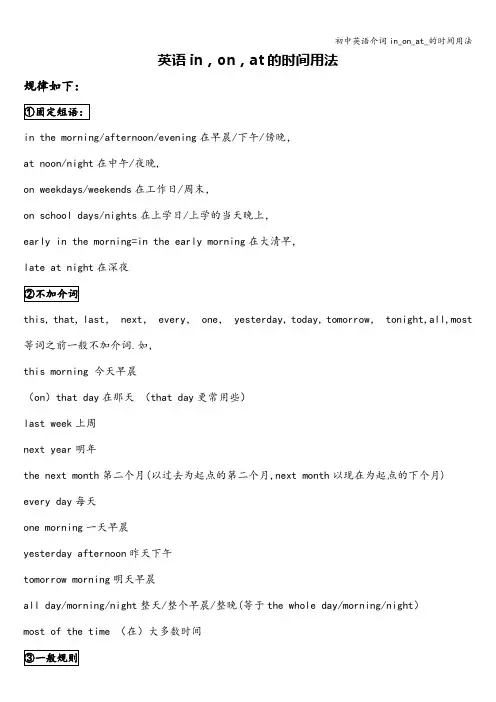
英语in,on,at的时间用法规律如下:in the morning/afternoon/evening在早晨/下午/傍晚,at noon/night在中午/夜晚,on weekdays/weekends在工作日/周末,on school days/nights在上学日/上学的当天晚上,early in the morning=in the early morning在大清早,late at night在深夜this, that, last, next, every, one, yesterday, today, tomorrow, tonight,all,most 等词之前一般不加介词.如,this morning 今天早晨(on)that day在那天(that day更常用些)last week上周next year明年the next month第二个月(以过去为起点的第二个月,next month以现在为起点的下个月) every day每天one morning一天早晨yesterday afternoon昨天下午tomorrow morning明天早晨all day/morning/night整天/整个早晨/整晚(等于the whole day/morning/night)most of the time (在)大多数时间除了前两点特殊用法之外,其他≤一天,用on,>一天用in,在具体时刻或在某时用at(不强调时间范围)关于onon my ninth birthday在我九岁生日那天on Teachers’Day在教师节(注意:节日里有表人的词汇一般都用复数在加s'所有格,如on Children’s Day,on Women’s Day, 有四个节日强调单数之意思,on Mother’s Day, on Father's Day,on April Fool’s Day,on Valentine’s Day)on Sunday在周日,on Sunday morning在周日早晨on June 2nd在六月二日on the second (of June 2nd) 在六月的第二天即在六月二日on the morning of June 2nd在六月二日的早晨,on a rainy morning在一个多雨的早晨注意:on Sunday在周日,on Sundays每逢周日(用复数表每逢之意),every Sunday每个周日,基本一个意思。
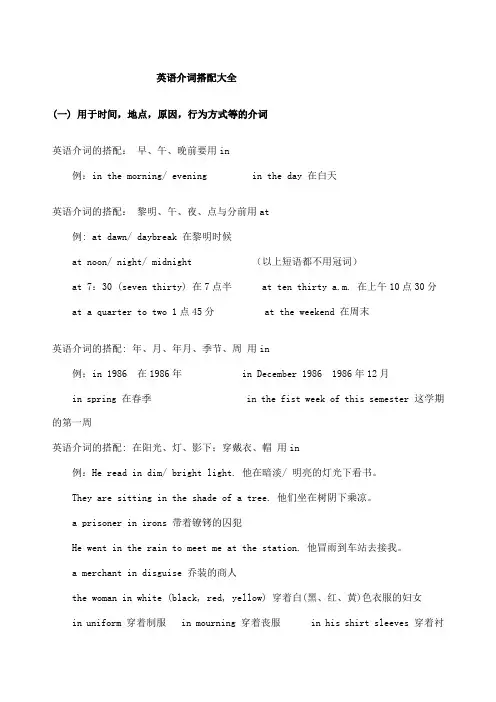
英语介词搭配大全(一) 用于时间,地点,原因,行为方式等的介词英语介词的搭配:早、午、晚前要用in例:in the morning/ evening in the day 在白天英语介词的搭配:黎明、午、夜、点与分前用at例: at dawn/ daybreak 在黎明时候at noon/ night/ midnight (以上短语都不用冠词)at 7:30 (seven thirty) 在7点半 at ten thirty a.m. 在上午10点30分at a quarter to two 1点45分 at the weekend 在周末英语介词的搭配: 年、月、年月、季节、周用in例;in 1986 在1986年 in December 1986 1986年12月in spring 在春季 in the fist week of this semester 这学期的第一周英语介词的搭配: 在阳光、灯、影下;穿戴衣、帽用in例:He read in dim/ bright light. 他在暗淡/ 明亮的灯光下看书。
They are sitting in the shade of a tree. 他们坐在树阴下乘凉。
a prisoner in irons 带着镣铐的囚犯He went in the rain to meet me at the station. 他冒雨到车站去接我。
a merchant in disguise 乔装的商人the woman in white (black, red, yellow) 穿着白(黑、红、黄)色衣服的妇女in uniform 穿着制服 in mourning 穿着丧服 in his shirt sleeves 穿着衬衫英语介词的搭配: 将来时态in.....表示:在… .以后例: I'll come round in a day or two/ in two days' time. 我一两天/ 两天后就回来。
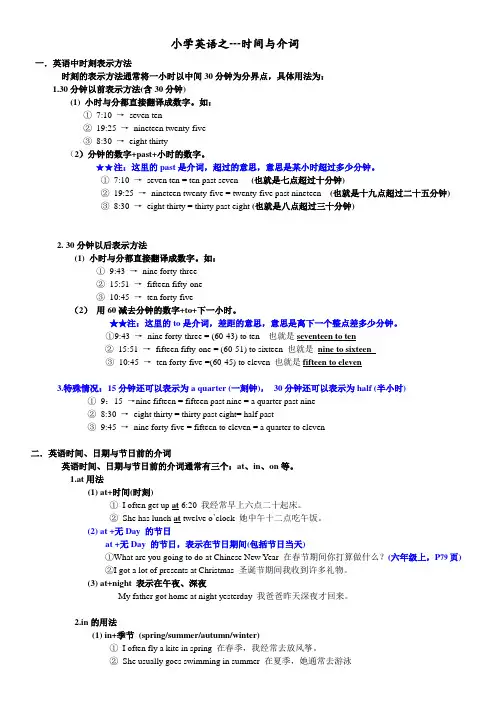
小学英语之---时间与介词一.英语中时刻表示方法时刻的表示方法通常将一小时以中间30分钟为分界点,具体用法为:1.30分钟以前表示方法(含30分钟)(1) 小时与分都直接翻译成数字。
如:①7:10 →seven ten②19:25 →nineteen twenty-five③8:30 →eight thirty(2)分钟的数字+past+小时的数字。
★★注:这里的past是介词,超过的意思,意思是某小时超过多少分钟。
①7:10 →seven ten = ten past seven (也就是七点超过十分钟)②19:25 →nineteen twenty-five = twenty-five past nineteen (也就是十九点超过二十五分钟)③8:30 →eight thirty = thirty past eight (也就是八点超过三十分钟)2. 30分钟以后表示方法(1) 小时与分都直接翻译成数字。
如:①9:43 →nine forty-three②15:51 →fifteen fifty-one③10:45 →ten forty-five(2)用60减去分钟的数字+to+下一小时。
★★注:这里的to是介词,差距的意思,意思是离下一个整点差多少分钟。
①9:43 →nine forty-three = (60-43) to ten 也就是seventeen to ten②15:51 →fifteen fifty-one = (60-51) to sixteen 也就是nine to sixteen③10:45 →ten forty-five =(60-45) to eleven 也就是fifteen to eleven3.特殊情况:15分钟还可以表示为a quarter (一刻钟),30分钟还可以表示为half (半小时)①9:15 →nine fifteen = fifteen past nine = a quarter past nine②8:30 →eight thirty = thirty past eight= half past③9:45 →nine forty-five = fifteen to eleven = a quarter to eleven二.英语时间、日期与节日前的介词英语时间、日期与节日前的介词通常有三个:at、in、on等。
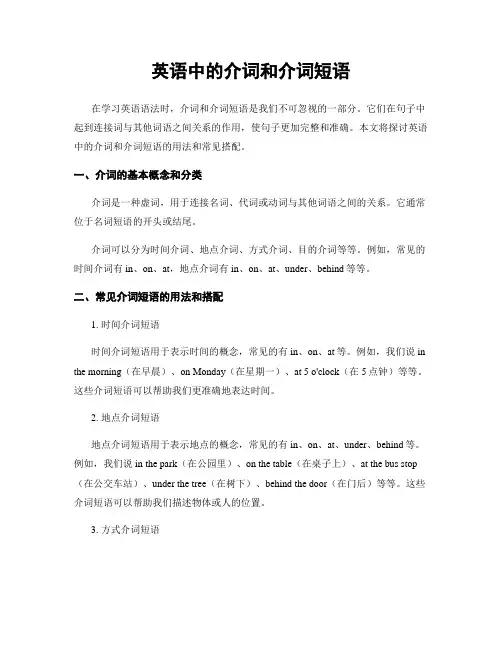
英语中的介词和介词短语在学习英语语法时,介词和介词短语是我们不可忽视的一部分。
它们在句子中起到连接词与其他词语之间关系的作用,使句子更加完整和准确。
本文将探讨英语中的介词和介词短语的用法和常见搭配。
一、介词的基本概念和分类介词是一种虚词,用于连接名词、代词或动词与其他词语之间的关系。
它通常位于名词短语的开头或结尾。
介词可以分为时间介词、地点介词、方式介词、目的介词等等。
例如,常见的时间介词有in、on、at,地点介词有in、on、at、under、behind等等。
二、常见介词短语的用法和搭配1. 时间介词短语时间介词短语用于表示时间的概念,常见的有in、on、at等。
例如,我们说in the morning(在早晨)、on Monday(在星期一)、at 5 o'clock(在5点钟)等等。
这些介词短语可以帮助我们更准确地表达时间。
2. 地点介词短语地点介词短语用于表示地点的概念,常见的有in、on、at、under、behind等。
例如,我们说in the park(在公园里)、on the table(在桌子上)、at the bus stop (在公交车站)、under the tree(在树下)、behind the door(在门后)等等。
这些介词短语可以帮助我们描述物体或人的位置。
3. 方式介词短语方式介词短语用于表示行为的方式或方法,常见的有by、with等。
例如,我们说by car(乘坐汽车)、with a pen(用一支笔)等等。
这些介词短语可以帮助我们描述行为或方式。
4. 目的介词短语目的介词短语用于表示目的或目标,常见的有for、to等。
例如,我们说study for the exam(为了考试而学习)、go to the park(去公园)等等。
这些介词短语可以帮助我们表达目的或动机。
三、介词和介词短语的常见错误用法在使用介词和介词短语时,我们需要注意一些常见的错误用法。
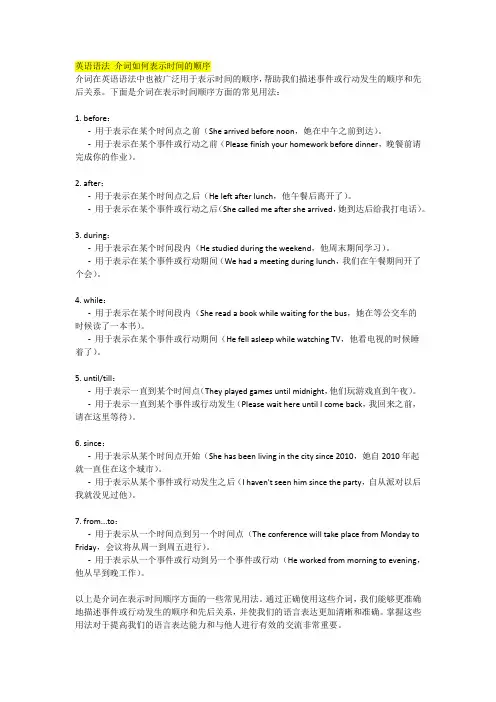
英语语法介词如何表示时间的顺序介词在英语语法中也被广泛用于表示时间的顺序,帮助我们描述事件或行动发生的顺序和先后关系。
下面是介词在表示时间顺序方面的常见用法:1. before:-用于表示在某个时间点之前(She arrived before noon,她在中午之前到达)。
-用于表示在某个事件或行动之前(Please finish your homework before dinner,晚餐前请完成你的作业)。
2. after:-用于表示在某个时间点之后(He left after lunch,他午餐后离开了)。
-用于表示在某个事件或行动之后(She called me after she arrived,她到达后给我打电话)。
3. during:-用于表示在某个时间段内(He studied during the weekend,他周末期间学习)。
-用于表示在某个事件或行动期间(We had a meeting during lunch,我们在午餐期间开了个会)。
4. while:-用于表示在某个时间段内(She read a book while waiting for the bus,她在等公交车的时候读了一本书)。
-用于表示在某个事件或行动期间(He fell asleep while watching TV,他看电视的时候睡着了)。
5. until/till:-用于表示一直到某个时间点(They played games until midnight,他们玩游戏直到午夜)。
-用于表示一直到某个事件或行动发生(Please wait here until I come back,我回来之前,请在这里等待)。
6. since:-用于表示从某个时间点开始(She has been living in the city since 2010,她自2010年起就一直住在这个城市)。
-用于表示从某个事件或行动发生之后(I haven't seen him since the party,自从派对以后我就没见过他)。
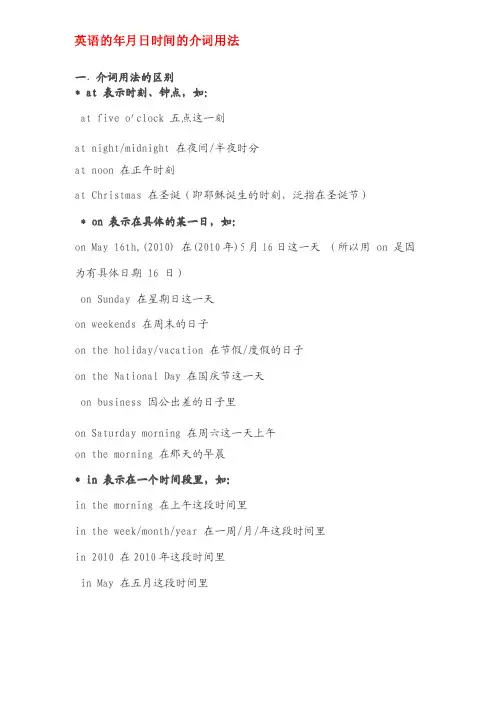
英语的年月日时间的介词用法一.介词用法的区别* at 表示时刻、钟点,如:at five o'clock 五点这一刻at night/midnight 在夜间/半夜时分at noon 在正午时刻at Christmas 在圣诞(即耶稣诞生的时刻,泛指在圣诞节)* on 表示在具体的某一日,如:on May 16th,(2010) 在(2010年)5月16日这一天(所以用 on 是因为有具体日期 16 日)on Sunday 在星期日这一天on weekends 在周末的日子on the holiday/vacation 在节假/度假的日子on the National Day 在国庆节这一天on business 因公出差的日子里on Saturday morning 在周六这一天上午on the morning 在那天的早晨* in 表示在一个时间段里,如:in the morning 在上午这段时间里in the week/month/year 在一周/月/年这段时间里in 2010 在2010年这段时间里in May 在五月这段时间里* 容易混淆的几个概念:1. 在XX节日里用介词 on,但是在圣诞节必须用 at at Christmas。
2. 圣诞节用 at Christmas,但是 Christmas day、Christmas Eve 则用 on。
3. in the afternoon 表示通常在下午这段时间,而 on the afternoon则表示在某一天的下午。
4. 早中晚一旦与具体日子一起出现,必须用 on,如 on Mondayevening, on the evening of May 16.二、时间表达方法例子:1.日、钟点: at 钟点 of 某一日 at 12 of the 17th2.日、早中晚: on the 早中晚 of 某一日 on the morning of the 17th3.月、日: on 某月某日 on May 174.月、日、钟点: at 钟点 of 某月某日 at 12 of May 175.月、日、早中晚: on 早中晚 of 某月某日,某年 on the morning of May 176.年、月: in 某月,某年 in May, 20107.年、月、日: on 某月某日,某年 on May 17, 20108.年、月、日、钟点 at 钟点 of 某月某日,某年 at 12 of May 17, 20109.年、月、日、早中晚:on the 早中晚 of 某月某日,某年 on the morning of May 17, 201010. 早中晚、钟点: at 钟点 + in the 早中晚—— at 2 in the afternoon11. 日、早中晚、钟点:at 钟点 + on the 早中晚 + of 日—— at 2 on the afternoon of18th12. 月、日、早中晚、钟点:at 钟点 + on the 早中晚 + of 月日—— at 2 on the afternoon of May 18th13.年、月、日、早中晚、钟点:at 钟点 + on the 早中晚 + of 月日,年—— at 2 on the afternoonof 18th,2010二、用of来连接在一起的时间的规律只要存在时刻(at...)或某日的时段(on the ...)就可以用“of 月日年”表示所属关系。
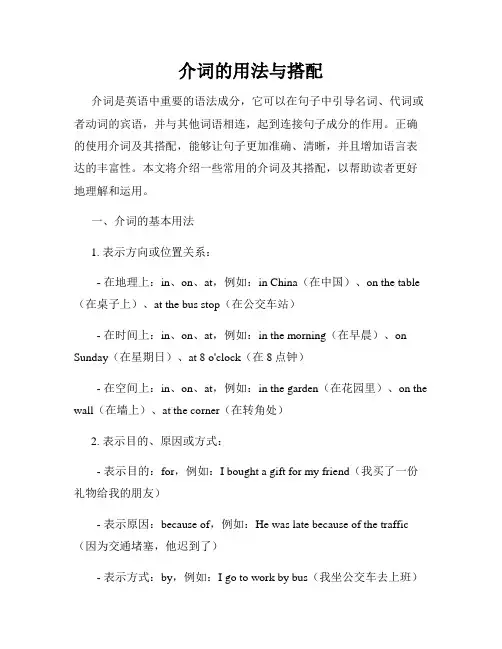
介词的用法与搭配介词是英语中重要的语法成分,它可以在句子中引导名词、代词或者动词的宾语,并与其他词语相连,起到连接句子成分的作用。
正确的使用介词及其搭配,能够让句子更加准确、清晰,并且增加语言表达的丰富性。
本文将介绍一些常用的介词及其搭配,以帮助读者更好地理解和运用。
一、介词的基本用法1. 表示方向或位置关系:- 在地理上:in、on、at,例如:in China(在中国)、on the table (在桌子上)、at the bus stop(在公交车站)- 在时间上:in、on、at,例如:in the morning(在早晨)、on Sunday(在星期日)、at 8 o'clock(在8点钟)- 在空间上:in、on、at,例如:in the garden(在花园里)、on the wall(在墙上)、at the corner(在转角处)2. 表示目的、原因或方式:- 表示目的:for,例如:I bought a gift for my friend(我买了一份礼物给我的朋友)- 表示原因:because of,例如:He was late because of the traffic (因为交通堵塞,他迟到了)- 表示方式:by,例如:I go to work by bus(我坐公交车去上班)3. 表示从属关系或比较:- 表示从属:of,例如:the book of Tom(汤姆的书)- 表示比较:than,例如:He is taller than me(他比我高)二、介词的搭配用法1. in的搭配用法:- in front of(在...前面),例如:He is standing in front of the building(他站在建筑物前面)- in the middle of(在...中间),例如:She is sitting in the middle of the room(她正坐在房间中间)- in addition to(除了...之外),例如:In addition to English, she also speaks French(除了英语,她还会讲法语)2. on的搭配用法:- on the left/right(在左/右边),例如:The bank is on the left side of the street(银行在街道的左边)- on top of(在...顶部),例如:There is a cup on top of the table (桌子上有一个杯子)- on behalf of(代表),例如:She is speaking on behalf of the team (她在代表团队发言)3. at的搭配用法:- at the beginning/end of(在...的开始/结束处),例如:At the endof the movie, everyone applauded(电影结束时,大家鼓掌) - at the same time(同时),例如:They arrived at the same time(他们同时到达)- at the age of(在...岁时),例如:He achieved his first success atthe age of 25(他25岁时取得了第一次成功)三、练习与总结正确使用介词需要不断练习,以下是一些练习题供读者巩固所学知识:1. 填入恰当的介词:a) He lives _______ the third floor.b) She is interested _______ learning foreign languages.c) We will meet _______ the library.2. 将下列句子翻译成英语:a) 我在上课的时候坐在教室后面。
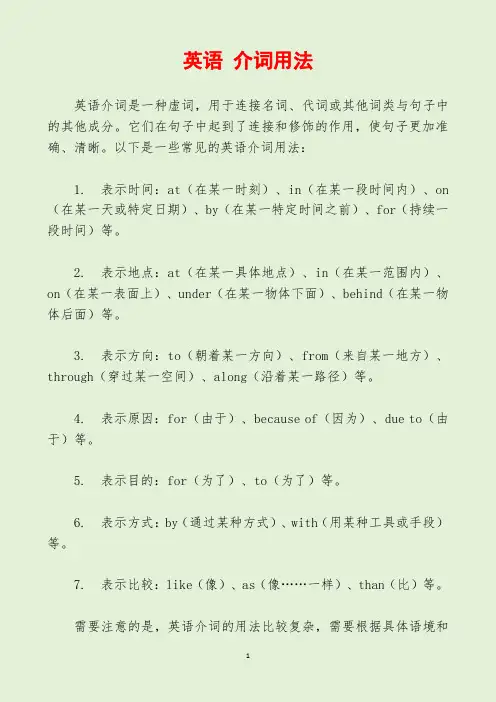
英语介词用法
英语介词是一种虚词,用于连接名词、代词或其他词类与句子中的其他成分。
它们在句子中起到了连接和修饰的作用,使句子更加准确、清晰。
以下是一些常见的英语介词用法:
1. 表示时间:at(在某一时刻)、in(在某一段时间内)、on (在某一天或特定日期)、by(在某一特定时间之前)、for(持续一段时间)等。
2. 表示地点:at(在某一具体地点)、in(在某一范围内)、on(在某一表面上)、under(在某一物体下面)、behind(在某一物体后面)等。
3. 表示方向:to(朝着某一方向)、from(来自某一地方)、through(穿过某一空间)、along(沿着某一路径)等。
4. 表示原因:for(由于)、because of(因为)、due to(由于)等。
5. 表示目的:for(为了)、to(为了)等。
6. 表示方式:by(通过某种方式)、with(用某种工具或手段)等。
7. 表示比较:like(像)、as(像……一样)、than(比)等。
需要注意的是,英语介词的用法比较复杂,需要根据具体语境和
句子结构来判断使用哪一个介词。
在学习和使用介词时,需要多读多练,逐渐掌握其用法。
初中英语in , on , at的时间用法规律如下:①固定短语:in the morni ng/afterno on /eve ning 在早晨/ 下午/ 傍晚,at noo n/night 在中午/夜晚,on weekdays/weekends 在工作日/周末,on school days/nights 在上学日/上学的当天晚上,early in the morni ng=i n the early morni ng 在大清早,late at night 在深夜②不加介词this, that, last, n ext, every, one, yesterday, today, tomorrow, toni ght most等词之前一般不加介词。
如,this morni ng 今天早晨(on)that day 在那天(that day 更常用些)last week 上周next year 明年the n ext mo nth 第二个月(以过去为起点的第二个月,next month 起点的下个月)every day 每天,all,以现在为one morni ng —天早晨yesterday after noon 昨天下午tomorrow morni ng 明天早晨all day/morning/night 整天/ 整个早晨/ 整晚(等于the wholeday/m orning/ni ght )most of the time (在)大多数时间③一般规则除了前两点特殊用法之外,其他w—天,用on ,>—天用in,在具体时刻或在某时用at (不强调时间范围)on my ninth birthday 在我九岁生日那天on Teachers ' Day 在教师节(注意:节日里有表人的词汇一般都用复数在加s'所有格,如on Children ' sDay, on Women ' s Day有四个节日强调单数之意思,on Mother ' s Day, on Father ' s Day, on April Fool ' s Day, on Valentine ' s Day )on Sun day 在周日,on Sun day morni ng 在周日早晨on June 2 nd在六月二日on the seco nd (of June 2 nd)在六月的第二天即在六月二日on the morning of June 2 nd在六月二日的早晨,on a rainy morning 在一个多雨的早晨注意:on Su nday 在周日,on Sun days每逢周日(用复数表每逢之意),everySun day每个周日,基本一个意思。
英语in,on,at的时间用法规律如下:in the morning/afternoon/evening在早晨/下午/黄昏,at noon/night在中午/夜晚,on weekdays/weekends在工作日/周末,on school days/nights在上学日/上学的当天晚上,early in the morning=in the early morning在大清早,late at night在深夜this, that, last, next, every, one, yesterday, today, tomorrow, tonight,all,most等词之前一般不加介词。
如,this morning 今天早晨〔on〕that day在那天〔that day更常用些〕last week上周next year明年the next month第二个月〔以过去为起点的第二个月,next month以现在为起点的下个月〕every day每天one morning一天早晨yesterday afternoon昨天下午tomorrow morning明天早晨all day/morning/night整天/整个早晨/整晚〔等于the wholeday/morning/night〕most of the time 〔在〕大多数时间除了前两点特殊用法之外,其他≤一天,用on,>一天用in,在具体时刻或在某时用at〔不强调时间范围〕关于onon my ninth birthday在我九岁生日那天on Teachers’Day在教师节〔注意:节日里有表人的词汇一般都用复数在加s’所有格,如on Children’s Day, on Women’s Day, 有四个节日强调单数之意思,on Mother’s Day, on Father’s Day, on April Fool’s Day, on Valentine’s Day〕on Sunday在周日,on Sunday morning在周日早晨on June 2nd在六月二日on the second (of June 2nd) 在六月的第二天即在六月二日on the morning of June 2nd在六月二日的早晨,on a rainy morning在一个多雨的早晨注意:on Sunday在周日,on Sundays每逢周日〔用复数表每逢之意〕,every Sunday每个周日,根本一个意思。
常用介词的用法和搭配常用介词是连接名词、代词、动词或其他词组的词汇,在英语中扮演着非常重要的角色。
介词的选择和搭配对语言的表达和理解都有着深远的影响。
下面是一份关于常用介词的用法和搭配,希望对您有所帮助。
一、关于位置和方向的介词1. in用于表示在某个大范围之内,例如in the room(在房间里),in the city(在城市里),in China(在中国)等。
2. on表示在一个较小的范围上,例如on the table(在桌子上),on the wall(在墙上),on the street(在街道上)等。
3. at表示在某特定的位置,例如at the park(在公园),at the bus stop(在公交车站),at home(在家)等。
4. to表示移向某个地点或目的地,例如go to school(去学校),go to the library(去图书馆),go to the office(去办公室)等。
5. from表示起始地点,例如from the airport(从机场),from the station(从车站),from home(从家)等。
6. into表示进入某个地点或位置,例如go into the house(进入房子),walk into the room (走进房间)等。
7. out of表示从某个地点或位置出来,例如get out of the car(从车里出来),walk out of the building(从建筑物里出来)等。
8. near表示接近或靠近某个位置,例如near the park(靠近公园),near the river(靠近河边)等。
9. between表示在两者之间,例如between the two buildings(两个建筑物之间),between the mountains(两座山之间)等。
以上是关于位置和方向的介词的一些常见用法和搭配,通过掌握这些介词,可以更准确地表达位置和方向的关系。
英语介词的使用和用法汇总表介词是英语中非常重要的词类之一,用来表达名词与名词、名词与动词、名词与形容词、名词与副词等之间的关系。
介词的正确使用和用法是英语学习的一个难点,下面是介词的使用和用法的汇总表。
一、表示时间关系的介词:1. on:用于特定的日期或星期几,如on Monday、on July 1st。
2. at:用于特定的时刻,如at 7 o'clock、at noon。
3. in:用于表示季节、月份、年份或较长的时间段,如in spring、in October、in 2022、in a week。
二、表示地点关系的介词:1. in:用于表示较大的范围或内部位置,如in the city、in the house。
2. at:用于表示具体的位置、建筑物或活动场所,如at the park、at the cinema。
3. on:用于表示平面的表面位置,如on the table、on the wall。
三、表示方式和方式的介词:1. with:表示伴随、附带的方式,如with a smile、with my friends。
2. by:表示通过某种方式或手段,如by train、by email。
3. in:表示以某种方式或状态,如in silence、in a hurry。
四、表示原因和目的的介词:1. for:表示目的、原因和动机,如for fun、for health、for thesake of。
2. because of:表示原因,如because of the rain、because of his mistake。
五、表示比较关系的介词:1. than:表示比较两个事物之间的差别,如taller than、more beautiful than。
2. as:表示与某事物相同或相似,如as tall as、as fast as。
六、表示紧接时间或顺序关系的介词:1. before:表示在某个时间或事件之前,如before class、before dinner。
1. 多少年,多少天以前,用这个词“ago”, 比如说,三年以前:three years
ago. 几星期以前, weeks ago, 一个半月以前:one month and a half ago,
下面,我们来看几个例句:
I bumped into my ex-boyfriend days ago. 我几天前无意间撞见了我的前男友。
Marry dropped out of school months ago. 玛丽几个月前辍学了。
We settled down in New York 2 weeks ago. 两星期前我们在纽约定居下来。
2. 多少年,多少天以后,用介词“in”,如:几年后:in years, in a couple
of years, 5个月后:in 5 months, 10天后:in 10 days:
I’ll let you know our final decision in a week. 一个星期后,我会通知
你我们的最后决定。
We’re moving to Guangzhou in 2 days. 两天后,我们就要搬去广州了。
3. 在。。。时间以内: within, within 2 weeks, within one year, within
7 months
The quotation is subject to your confirmation by fax within one week.
此报价以你以传真形式在一周内确认为有效。
4.“before”, “after”这两个词怎么用呢?,它们的后面可以接从句,:
“before” 在某事发生之前,“after”在某事发生之后:
I was only a clerk before I came to Guangzhou. 在我来广州之前,我只是个
小文员.
We went to a concert after we finished our work. 我们下班后去听了音乐
会.
“before”, “after”这两个词后面还可以接名词:
I would like to have a chat with you before meal. 吃饭前我想和你谈一下。
I’ll meet you at the entrance after class. 课后我们在入口处见。